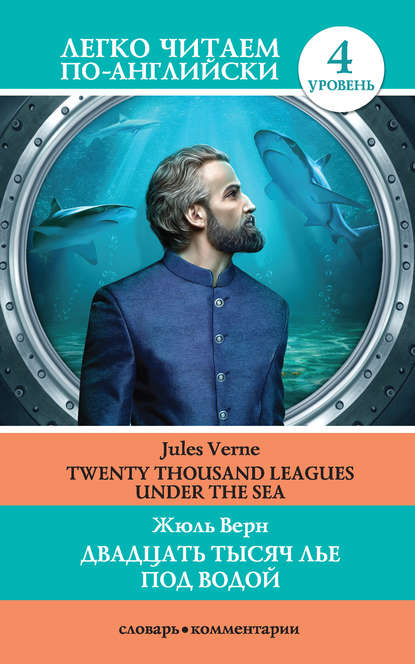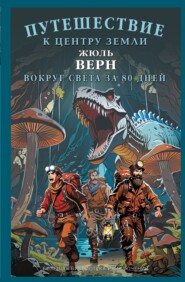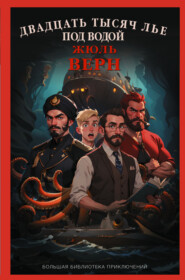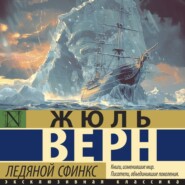По всем вопросам обращайтесь на: info@litportal.ru
(©) 2003-2024.
✖
Двадцать тысяч лье под водой / Twenty Thousand Leagues Under the Sea
Настройки чтения
Размер шрифта
Высота строк
Поля
J. B. Hobson,
Secretary of the Navy.
Chapter 3
Three seconds after reading this letter from the honorable Secretary of the Navy, I understood that my true vocation, my sole purpose in life, was to hunt down this disturbing monster and rid the world of it.
I had just returned from an arduous journey, exhausted and badly needing a rest. I wanted nothing more than to see my country again, my friends, my modest quarters by the Botanical Gardens, my dearly beloved collections! But now nothing could have held me back. I forgot everything else, and without another thought of exhaustion, friends, or collections, I accepted the American government’s offer.
“Besides,” I thought, “all roads lead home to Europe, and our unicorn may be gracious enough to take me toward the coast of France! That fine animal may even let itself be captured in European seas—as a personal favor to me—and I’ll bring back to the Museum of Natural History at least half a meter of its ivory lance! Conseil[13 - Conseil – Консель]!” I called in an impatient voice.
Conseil was my servant. A devoted lad who went with me on all my journeys; a gallant Flemish boy whom I genuinely liked and who returned the compliment; a born stoic, punctilious on principle, hardworking, very skillful with his hands.
In Conseil I had a specialist in biological classification, an enthusiast who could run with acrobatic agility up and down the whole ladder of branches, groups, classes, subclasses, orders, families, genera, subgenera, species, and varieties. Classifying was everything to him, so he knew nothing else. And yet, what a fine, gallant lad he was!
For the past ten years, Conseil had gone with me everywhere. The lad was thirty years old, and I had turned forty.
Conseil had but one flaw. He was a fanatic on formality, and he only addressed me in the third person.
“Conseil!” I repeated, while beginning my preparations for departure. I had confidence in this devoted lad. Ordinarily, I never asked whether or not it suited him to go with me on my journeys; but this time an expedition could drag on indefinitely. What would Conseil say?
“Conseil!” I called a third time.
Conseil appeared.
“Did master summon me?” he said, entering.
“Yes, my boy. Get my things ready, get yours ready. We’re departing in two hours.”
“As master wishes,” Conseil replied serenely.
“We haven’t a moment to lose. Pack as much into my trunk as you can, my traveling kit, my suits, shirts, and socks, just squeeze it all in—and hurry!”
“What about master’s collections?” Conseil observed.
“We’ll deal with them later. The hotel will keep them for us.”
“Then we aren’t returning to Paris?” Conseil asked.
“Yes, we are … certainly … ,” I replied evasively, “but after we make a detour.”
“Whatever detour master wishes.”
“Oh, it’s nothing really! A route slightly less direct, that’s all. We’re leaving on the Abraham Lincoln.”
“As master thinks best,” Conseil replied placidly.
“You see, my friend, we’re going to rid the seas of the monster, the notorious narwhale! It’s a glorious mission but also a dangerous one! We don’t know where it will take us! These beasts can be quite unpredictable!”
“What master does, I’ll do,” Conseil replied.
“But think it over, because I don’t want to hide anything from you. This is one of those voyages from which people don’t always come back!”
“As master wishes.”
A quarter of an hour later, our trunks were ready. Conseil did them in a flash, and I was sure the lad hadn’t missed a thing, because he classified shirts and suits as expertly as birds and mammals.
For a fare of twenty francs, the vehicle went down Broadway to Union Square, took Fourth Ave. to its junction with Bowery St., turned into Katrin St. and halted at Pier 34. There the ferry transferred men, horses, and carriage to Brooklyn, and in a few minutes we arrived at the wharf next to which the Abraham Lincoln was vomiting torrents of black smoke from its two funnels.
Our baggage was immediately carried to the deck of the frigate. I rushed aboard and asked for Commander Farragut. One of the sailors led me to the afterdeck. I saw a smart-looking officer who extended his hand to me.
“Professor Pierre Aronnax?” he said to me.
“The same[14 - the same – он самый],” I replied. “Commander Farragut?”
“In person. Welcome aboard, professor. Your cabin is waiting for you.”
I bowed, and I was taken to the cabin.
The Abraham Lincoln was a high-speed frigate furnished with superheating equipment. Under the pressure it reached an average speed of 18.3 miles per hour, a considerable speed, but still not enough to cope with our gigantic cetacean.
I was satisfied with my cabin, which was located in the stern.
“We’ll be quite comfortable here,” I told Conseil.
I climbed on deck to watch the preparations for getting under way. If I’d been delayed by a quarter of an hour or even less, the frigate would have gone without me, and I would have missed out on this unearthly, extraordinary, and inconceivable expedition.
But Commander Farragut didn’t want to waste a single day, or even a single hour, in making for those seas where the animal had just been sighted.
“Go ahead!” Commander Farragut called.
Chapter 4
Commander Farragut was a good seaman, worthy of the frigate he commanded. His ship and he were one. He was its very soul. He believed in cetacean as certain pious women believe in the leviathan from the Book of Job[15 - the Book of Job – «Книга Иова»]—out of faith, not reason. The monster existed, and he had vowed to rid the seas of it. Either Commander Farragut would slay the narwhale, or the narwhale would slay Commander Farragut. No middle of the road for these two.
The ship’s officers shared the views of their leader. They were chatting, discussing, arguing, calculating the different chances of an encounter, and observing the vast expanse of the ocean.
As for the crew, they only wanted to encounter the unicorn, harpoon it, haul it on board, and carve it up. They surveyed the sea with scrupulous care. Besides, Commander Farragut had mentioned that a certain sum of $2,000 was waiting for the man who first sighted the animal, be he cabin boy or sailor, mate or officer.
As I said, Commander Farragut had carefully equipped his ship with all the gear needed to fish for a gigantic cetacean. No vessel could have been better armed. We had every known mechanism. On the forecastle was mounted the latest model cannon, a weapon that figured in the Universal Exhibition of 1867.
Moreover, the Abraham Lincoln had Ned Land[16 - Ned Land – Нед Ленд], the King of Harpooners. Gifted with uncommon manual ability, Ned Land was a Canadian who had no equal in his dangerous trade. Dexterity, coolness, bravery, and cunning were virtues he possessed to a high degree. He was about forty years old. A man of great height, he was powerfully built, serious in manner, not very sociable, sometimes headstrong, and quite ill-tempered when crossed.
Commander Farragut, to my thinking, had made a wise move in hiring on this man. With his eye and his throwing arm, he was worth the whole crew all by himself. I can compare him with a powerful telescope that could serve as a cannon always ready to fire.
To say Canadian is to say French. No doubt it was my nationality that attracted him. It was an opportunity for him to speak, and for me to hear, that old dialect still used in some Canadian provinces.
Little by little Ned developed a taste for chatting, and I loved hearing the tales of his adventures in the polar seas. He described his fishing trips and his battles with great natural lyricism.
I’m writing of this bold companion as I currently know him. Ah, my gallant Ned! I ask only to live 100 years more, the longer to remember you!
Secretary of the Navy.
Chapter 3
Three seconds after reading this letter from the honorable Secretary of the Navy, I understood that my true vocation, my sole purpose in life, was to hunt down this disturbing monster and rid the world of it.
I had just returned from an arduous journey, exhausted and badly needing a rest. I wanted nothing more than to see my country again, my friends, my modest quarters by the Botanical Gardens, my dearly beloved collections! But now nothing could have held me back. I forgot everything else, and without another thought of exhaustion, friends, or collections, I accepted the American government’s offer.
“Besides,” I thought, “all roads lead home to Europe, and our unicorn may be gracious enough to take me toward the coast of France! That fine animal may even let itself be captured in European seas—as a personal favor to me—and I’ll bring back to the Museum of Natural History at least half a meter of its ivory lance! Conseil[13 - Conseil – Консель]!” I called in an impatient voice.
Conseil was my servant. A devoted lad who went with me on all my journeys; a gallant Flemish boy whom I genuinely liked and who returned the compliment; a born stoic, punctilious on principle, hardworking, very skillful with his hands.
In Conseil I had a specialist in biological classification, an enthusiast who could run with acrobatic agility up and down the whole ladder of branches, groups, classes, subclasses, orders, families, genera, subgenera, species, and varieties. Classifying was everything to him, so he knew nothing else. And yet, what a fine, gallant lad he was!
For the past ten years, Conseil had gone with me everywhere. The lad was thirty years old, and I had turned forty.
Conseil had but one flaw. He was a fanatic on formality, and he only addressed me in the third person.
“Conseil!” I repeated, while beginning my preparations for departure. I had confidence in this devoted lad. Ordinarily, I never asked whether or not it suited him to go with me on my journeys; but this time an expedition could drag on indefinitely. What would Conseil say?
“Conseil!” I called a third time.
Conseil appeared.
“Did master summon me?” he said, entering.
“Yes, my boy. Get my things ready, get yours ready. We’re departing in two hours.”
“As master wishes,” Conseil replied serenely.
“We haven’t a moment to lose. Pack as much into my trunk as you can, my traveling kit, my suits, shirts, and socks, just squeeze it all in—and hurry!”
“What about master’s collections?” Conseil observed.
“We’ll deal with them later. The hotel will keep them for us.”
“Then we aren’t returning to Paris?” Conseil asked.
“Yes, we are … certainly … ,” I replied evasively, “but after we make a detour.”
“Whatever detour master wishes.”
“Oh, it’s nothing really! A route slightly less direct, that’s all. We’re leaving on the Abraham Lincoln.”
“As master thinks best,” Conseil replied placidly.
“You see, my friend, we’re going to rid the seas of the monster, the notorious narwhale! It’s a glorious mission but also a dangerous one! We don’t know where it will take us! These beasts can be quite unpredictable!”
“What master does, I’ll do,” Conseil replied.
“But think it over, because I don’t want to hide anything from you. This is one of those voyages from which people don’t always come back!”
“As master wishes.”
A quarter of an hour later, our trunks were ready. Conseil did them in a flash, and I was sure the lad hadn’t missed a thing, because he classified shirts and suits as expertly as birds and mammals.
For a fare of twenty francs, the vehicle went down Broadway to Union Square, took Fourth Ave. to its junction with Bowery St., turned into Katrin St. and halted at Pier 34. There the ferry transferred men, horses, and carriage to Brooklyn, and in a few minutes we arrived at the wharf next to which the Abraham Lincoln was vomiting torrents of black smoke from its two funnels.
Our baggage was immediately carried to the deck of the frigate. I rushed aboard and asked for Commander Farragut. One of the sailors led me to the afterdeck. I saw a smart-looking officer who extended his hand to me.
“Professor Pierre Aronnax?” he said to me.
“The same[14 - the same – он самый],” I replied. “Commander Farragut?”
“In person. Welcome aboard, professor. Your cabin is waiting for you.”
I bowed, and I was taken to the cabin.
The Abraham Lincoln was a high-speed frigate furnished with superheating equipment. Under the pressure it reached an average speed of 18.3 miles per hour, a considerable speed, but still not enough to cope with our gigantic cetacean.
I was satisfied with my cabin, which was located in the stern.
“We’ll be quite comfortable here,” I told Conseil.
I climbed on deck to watch the preparations for getting under way. If I’d been delayed by a quarter of an hour or even less, the frigate would have gone without me, and I would have missed out on this unearthly, extraordinary, and inconceivable expedition.
But Commander Farragut didn’t want to waste a single day, or even a single hour, in making for those seas where the animal had just been sighted.
“Go ahead!” Commander Farragut called.
Chapter 4
Commander Farragut was a good seaman, worthy of the frigate he commanded. His ship and he were one. He was its very soul. He believed in cetacean as certain pious women believe in the leviathan from the Book of Job[15 - the Book of Job – «Книга Иова»]—out of faith, not reason. The monster existed, and he had vowed to rid the seas of it. Either Commander Farragut would slay the narwhale, or the narwhale would slay Commander Farragut. No middle of the road for these two.
The ship’s officers shared the views of their leader. They were chatting, discussing, arguing, calculating the different chances of an encounter, and observing the vast expanse of the ocean.
As for the crew, they only wanted to encounter the unicorn, harpoon it, haul it on board, and carve it up. They surveyed the sea with scrupulous care. Besides, Commander Farragut had mentioned that a certain sum of $2,000 was waiting for the man who first sighted the animal, be he cabin boy or sailor, mate or officer.
As I said, Commander Farragut had carefully equipped his ship with all the gear needed to fish for a gigantic cetacean. No vessel could have been better armed. We had every known mechanism. On the forecastle was mounted the latest model cannon, a weapon that figured in the Universal Exhibition of 1867.
Moreover, the Abraham Lincoln had Ned Land[16 - Ned Land – Нед Ленд], the King of Harpooners. Gifted with uncommon manual ability, Ned Land was a Canadian who had no equal in his dangerous trade. Dexterity, coolness, bravery, and cunning were virtues he possessed to a high degree. He was about forty years old. A man of great height, he was powerfully built, serious in manner, not very sociable, sometimes headstrong, and quite ill-tempered when crossed.
Commander Farragut, to my thinking, had made a wise move in hiring on this man. With his eye and his throwing arm, he was worth the whole crew all by himself. I can compare him with a powerful telescope that could serve as a cannon always ready to fire.
To say Canadian is to say French. No doubt it was my nationality that attracted him. It was an opportunity for him to speak, and for me to hear, that old dialect still used in some Canadian provinces.
Little by little Ned developed a taste for chatting, and I loved hearing the tales of his adventures in the polar seas. He described his fishing trips and his battles with great natural lyricism.
I’m writing of this bold companion as I currently know him. Ah, my gallant Ned! I ask only to live 100 years more, the longer to remember you!

















